|
|
|
Sort Order |
|
|
|
Items / Page
|
|
|
|
|
|
|
| Srl | Item |
| 1 |
ID:
152958


|
|
|
|
|
| Summary/Abstract |
This issue of Small Wars and Insurgencies focuses on the continuing importance of Maoist and post-Maoist concepts of people’s war. It has assembled a collection of papers that addresses various examples from around the world, with an emphasis on South America, where the premier illustration, that of Colombia’s FARC, was Marxist-Leninist but not Maoist, yet embraced the form and strategy of people’s war in a bid which at one point had the state in a critical situation. The collection comes in the wake of previous papers published in this journal on politically Maoist insurgent movements in South Asia, notably Mika Kerttuenen’s study of Maoist insurgents in Nepal and Prem Mahadevan’s survey of Maoist insurgencies in India and their links to organized crime (Kerttunen, “A Transformed Insurgency,” 78–118; Mahadevan, “The Maoist Insurgency in India,” 203–20). The papers confirm that people’s war remains an important analytical framework in the study of small wars and insurgencies, for some even a ‘model’ through which to understand distinct types of insurgent movements and their strategies.
|
|
|
|
|
|
|
|
|
|
|
|
|
|
|
|
| 2 |
ID:
158962


|
|
|
|
|
| Summary/Abstract |
In June 2016, the Colombian Government and the FARC insurgent movement signed a ceasefire agreement, which brings the two sides one step closer to putting an end to over five decades of war. Unfortunately, Latin America has a rich history of insurgent movements, particularly during the cold war era, some of which continue to operate today. Most of these movements disappeared due to military operations, though some did so via peace negotiations. This essay aims to discuss the various ends of Latin American insurgencies to answer whether, indeed, insurgents can be negotiated with.
|
|
|
|
|
|
|
|
|
|
|
|
|
|
|
|
| 3 |
ID:
110514
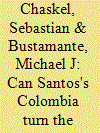

|
|
|
|
|
| Publication |
2012.
|
| Summary/Abstract |
"Haunted by deep disparities and an unspeakable history of violence, the country may discover that 'democratic prosperity' remains an elusive horizon."
|
|
|
|
|
|
|
|
|
|
|
|
|
|
|
|
| 4 |
ID:
190150
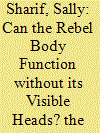

|
|
|
|
|
| Summary/Abstract |
Mid-level commanders are commonly considered the visible heads of the rebel body: as leaders of combat operations, they are often targeted in counterterrorism or counterinsurgency operations. While their role during conflict has been theorized extensively, only recent scholarship has focused on mid-level commanders in post-conflict transitions. Specifically, it is not clear how mid-level commanders function within ex-combatant groups to create divergent peacebuilding results. This paper argues that transitions from conflict involve fraying of wartime bonds and rebel command-and-control structures, which is counterproductive to peace when rebels demobilize collectively. In peacetime and in the absence of wartime command, social groups formed through military logic struggle to redefine individual roles. Mid-level commanders, responsible for shaping intergroup bonds during conflict, are essential for allocating ex-combatant roles and redefining rebel-civilian relations. Against the common practice of breaking rebel wartime command-and-control structure during demobilization, this paper argues that ex-combatant groups can demobilize and reintegrate more successfully if they maintain their wartime cohesion and are provided the necessary tools for building sustainable livelihoods. To support the argument, the paper provides original qualitative and quantitative evidence from the Disarmament, Demobilization, and Reintegration (DDR) programme with the Revolutionary Armed Forces of Colombia (FARC).
|
|
|
|
|
|
|
|
|
|
|
|
|
|
|
|
| 5 |
ID:
108349
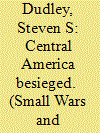

|
|
|
|
|
| Publication |
2011.
|
| Summary/Abstract |
The following is a threat assessment of the seven countries that make up Central America. That region is struggling to control burgeoning street gangs and organized criminal groups which have overrun its poor and ill-prepared security forces. The results are clear: rising crime and homicide rates throughout the region; corruption and instability within the governments. The two gangs that challenge authority are transnational in nature but pose less a threat to national security than they do to everyday life. Their drug peddling and extortion have shattered entire communities and forced the governments to reallocate important resources. The governments' strategy of jailing suspected gang members en masse has arguably made them stronger rather than weaker. Meanwhile, the organized criminal groups have deeply penetrated governments at nearly every level. They control swaths of territory, co-opting these areas, as well as the local governments, for their own purposes. Opposition to them is often futile. Mexican-based organizations are increasingly using violent tactics to displace their rivals. The governments of the region seem unprepared to meet the challenge.
|
|
|
|
|
|
|
|
|
|
|
|
|
|
|
|
| 6 |
ID:
118273
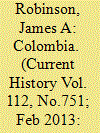

|
|
|
|
|
| Publication |
2013.
|
| Summary/Abstract |
[D]espite all of the gains under the past two presidents, neither administration has broken with the fundamental system of governance that created the country's problems.
|
|
|
|
|
|
|
|
|
|
|
|
|
|
|
|
| 7 |
ID:
131980
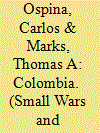

|
|
|
|
|
| Publication |
2014.
|
| Summary/Abstract |
From 1965 to the present, Colombia has been confronted by the insurgency of the Revolutionary Armed Forces of Colombia (FARC). The threat reached a new level in 1996 with the advent of mobile warfare, whereby large units sought to neutralize the military in an effort to seize power and institute a Marxist-Leninist regime. Unlike Vietnam, what followed was a regaining of the strategic initiative by the government and a decimation of the insurgent threat. This was accomplished with US assistance but from first to last was driven by Colombian leadership and strategy. The strategy which led to this signal change, 'Democratic Security', unfolded under the leadership of President Álvaro Uribe. It was a civil-military partnership, which sought to expand the writ of Colombian democracy to all elements of society. Securing the population provided the shield behind which economic, social, and political life could occur as driven by the will of the people. It was the agreement upon legitimacy as the strategic goal and reform as the route to that goal which allowed the Colombians and the Americans to work so well together.
|
|
|
|
|
|
|
|
|
|
|
|
|
|
|
|
| 8 |
ID:
151289


|
|
|
| 9 |
ID:
115387


|
|
|
| 10 |
ID:
131875
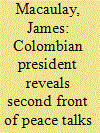

|
|
|
| 11 |
ID:
139113
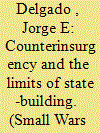

|
|
|
|
|
| Summary/Abstract |
Since 2002 the Colombian government has been implementing a series of policy initiatives that have sought to coordinate state resources in a neo-classical counterinsurgency approach to fight the country's main insurgent group, the Fuerzas Armadas Revolucionarias de Colombia (FARC), and recover and consolidate the territory. Despite impressive operational successes against the insurgency and other illegal groups, the government has been unable to reassert its control and build legitimacy via the state-building effort known as ‘Consolidación’, in some of the most recalcitrant areas of the country. This article examines two areas where government efforts at consolidation appear to be failing to discuss the limits of COIN theory and practice.
|
|
|
|
|
|
|
|
|
|
|
|
|
|
|
|
| 12 |
ID:
089089
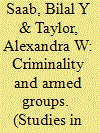

|
|
|
|
|
| Summary/Abstract |
Terrorist groups and armed insurgents regularly exploit illicit markets to launder money, traffic illegal goods, and purchase arms. In such an environment, the line between armed political organizations and criminal groups appears to break down. However, through a comparative study of paramilitary groups and Fuerzas Armadas Revolucionarias de Colombia (Revolutionary Armed Forces of Colombia-FARC) in Colombia, this article finds that group goals, the political environment, and membership strongly influence the types of criminal activities a given armed groups undertakes. Thus, the membership and political agenda of sub-state armed groups not only distinguishes them from criminal groups-organized for and motivated by economic gain-but also shapes their criminal behavior.
|
|
|
|
|
|
|
|
|
|
|
|
|
|
|
|
| 13 |
ID:
152964
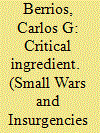

|
|
|
|
|
| Summary/Abstract |
In assisting states facing insurgencies, few subjects are more vital than understanding the manner in which external aid can be applied in a sustainable manner. Colombia, touted by proponents as a case study for astute application of external reinforcement for democracy, is just as often held up by critics as an illustration of the misplaced priorities of the US. No part of the critique is more prevalent than assertions concerning the nature of US military assistance. American aid to counterinsurgency filled particular capacity gaps and enhanced capabilities that already existed. These were possible due to the Colombian ability to absorb input.
|
|
|
|
|
|
|
|
|
|
|
|
|
|
|
|
| 14 |
ID:
149819


|
|
|
| 15 |
ID:
152680


|
|
|
| 16 |
ID:
129598


|
|
|
| 17 |
ID:
122229
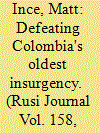

|
|
|
|
|
| Publication |
2013.
|
| Summary/Abstract |
The decision to enter into peace negotiations with the FARC represents the latest in a series of attempts by Colombia's Santos administration to prioritise political over military activities in seeking an end to the country's internal conflict. Yet despite favourable political conditions, a number of major challenges remain which could prevent a meaningful peace settlement from coming to fruition. Matt Ince argues that the single largest obstacle in this regard is the potential for the talks to cause fragmentation within the FARC, an outcome that could impede its leaders in negotiating a settlement viewed as legitimate by the entire organisation, while opening the door to the emergence of FARC splinter groups in the period ahead.
|
|
|
|
|
|
|
|
|
|
|
|
|
|
|
|
| 18 |
ID:
129308
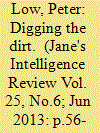

|
|
|
| 19 |
ID:
190758
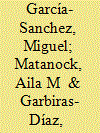

|
|
|
|
|
| Summary/Abstract |
To what extent are legislators, responsible for the implementation of many peace agreements, responsive to citizens’ preferences? Examining the 2016 Colombian peace agreement, we embed an experiment in the 2019 wave of a survey of all the members of Congress. We inform legislators about the attitudes of the general population and residents of conflict-affected regions on a provision included in the peace agreement: the creation of 16 special seats in the House of Representatives reserved for conflict areas. We find that legislators underestimate citizen support for this policy, and the magnitude of their misconception is correlated with the positions of their parties on the issue. Moreover, we find that providing information about citizens’ support for the policy does not affect legislator support for the provision.
|
|
|
|
|
|
|
|
|
|
|
|
|
|
|
|
| 20 |
ID:
156919
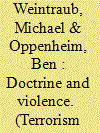

|
|
|
|
|
| Summary/Abstract |
Military theorists and practitioners have long argued that training shapes how combatants treat civilians during war. Yet there is little systematic evidence regarding the impact of training on wartime behavior, and almost none for non-state armed groups, despite the fact that such groups intensively train their fighters in order to shape their behavior towards civilian populations. This article argues that among insurgent groups that emphasize the strategic and tactical importance of restraint towards civilian populations, political training can reduce civilian killings. We test the observable implications of our theory in the case of Colombia, using survey data on former Revolutionary Armed Forces of Colombia (FARC) insurgents and sub-national data on civilian killings. We find support for our hypothesis, with results that are robust to a range of model specifications and controls, including alternate sources of combatant discipline and obedience, such as military training and punishment.
|
|
|
|
|
|
|
|
|
|
|
|
|
|
|
|
|
|
|
|
|